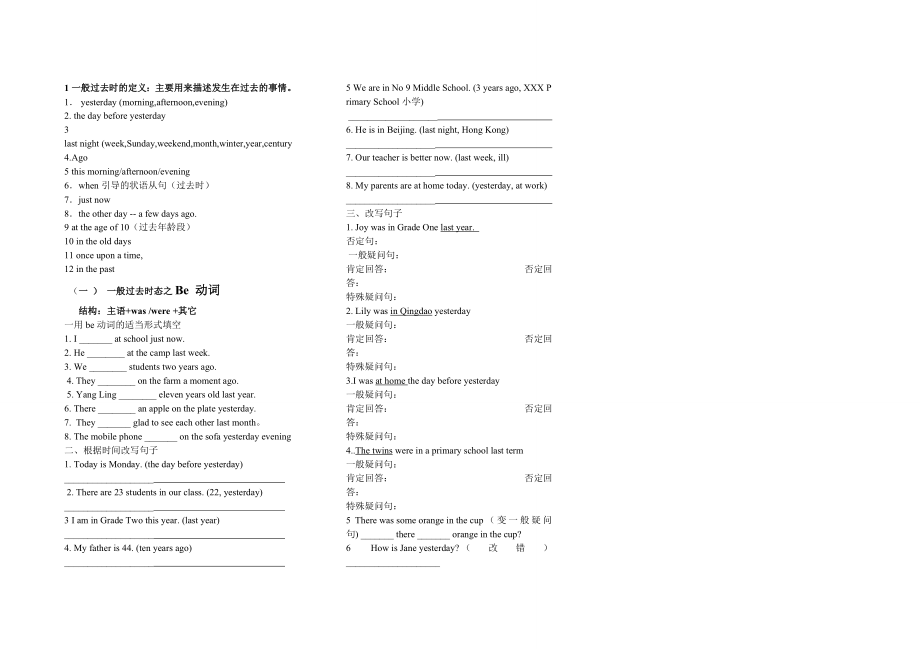《仁愛(ài)版七年級(jí)下一般過(guò)去時(shí)專(zhuān)講專(zhuān)練.doc》由會(huì)員分享����,可在線閱讀,更多相關(guān)《仁愛(ài)版七年級(jí)下一般過(guò)去時(shí)專(zhuān)講專(zhuān)練.doc(3頁(yè)珍藏版)》請(qǐng)?jiān)谘b配圖網(wǎng)上搜索�。
1、1一般過(guò)去時(shí)的定義:主要用來(lái)描述發(fā)生在過(guò)去的事情�。1 yesterday(morning,afternoon,evening)2. thedaybeforeyesterday3 lastnight(week,Sunday,weekend,month,winter,year,century4. Ago5 this morning/afternoon/evening6 when引導(dǎo)的狀語(yǔ)從句(過(guò)去時(shí))7 just now8 theotherday-afewdaysago.9attheageof10(過(guò)去年齡段)10intheolddays11onceuponatime,12 inthepast (
2、一 ) 一般過(guò)去時(shí)態(tài)之Be 動(dòng)詞 結(jié)構(gòu):主語(yǔ)+was /were +其它一用be動(dòng)詞的適當(dāng)形式填空1. I_atschooljustnow.2. He_atthecamplastweek.3. We_studentstwoyearsago.4.They_onthefarmamomentago.5.YangLing_elevenyearsoldlastyear.6. There_anappleontheplateyesterday.7. They_gladtoseeeachotherlastmonth�����。8.Themobilephone_onthesofayesterdayevening二、根據(jù)時(shí)
3���、間改寫(xiě)句子1.TodayisMonday.(thedaybeforeyesterday)_ 2.Thereare23studentsinourclass.(22,yesterday)_ 3IaminGradeTwothisyear.(lastyear)_ 4. Myfatheris44.(tenyearsago)_ 5WeareinNo9MiddleSchool.(3yearsago,XXXPrimarySchool小學(xué))_ 6.HeisinBeijing.(lastnight,HongKong)_ 7.Ourteacherisbetternow.(lastweek,ill)_ 8.Mypar
4���、entsareathometoday.(yesterday,atwork)_ 三、改寫(xiě)句子1.JoywasinGradeOnelastyear.否定句:一般疑問(wèn)句: 肯定回答: 否定回答:特殊疑問(wèn)句:2. LilywasinQingdaoyesterday一般疑問(wèn)句: 肯定回答: 否定回答:特殊疑問(wèn)句:3. Iwasathomethedaybeforeyesterday一般疑問(wèn)句: 肯定回答: 否定回答:特殊疑問(wèn)句:4. .Thetwinswereinaprimaryschoollastterm一般疑問(wèn)句: 肯定回答: 否定回答:特殊疑問(wèn)句:5 Therewassomeorangeinthec
5�、up(變一般疑問(wèn)句)_there_orangeinthecup?6 HowisJaneyesterday?(改錯(cuò))_7 There_(be)noonehereamomentago四 單項(xiàng)選擇( )1MyfatherillyesterdayAisntBarentCwasntDwerent( )2yourparentsathomelastweekAIsBWasCAreDWere( )3ThetwinsinDalianlastyear TheyherenowAare;wereBwere;areCwas;areDwere;was( )4yourfatheratworktheday yesterday(
6、前天)AWas;beforeBIs;beforeCWas;afterDIs;after( )5WhowasondutylastFridayAIamBIwasCYes,IwasDNo,Iwasnt( )1MyfatherillyesterdayAisntBarentCwasntDwerent( )2yourparentsathomelastweekAIsBWasCAreDWere( )3ThetwinsinDalianlastyearTheyherenowAare;wereBwere;areCwas;areDwere;was( )4yourfatheratworkthedayyesterdayA
7��、Was;beforeBIs;before CWas;afterDIs;after()5WhowasondutylastFridayAIamBIwasCYes,IwasDNo,Iwasn(二 ) 一般過(guò)去時(shí)態(tài)之情態(tài)動(dòng)詞 結(jié)構(gòu):主語(yǔ)+情態(tài)動(dòng)詞過(guò)去式+其它情態(tài)動(dòng)詞的一般現(xiàn)在時(shí)can/shall/will/may/must情態(tài)動(dòng)詞的一般過(guò)去時(shí)could/should/would/might/must情態(tài)動(dòng)詞特點(diǎn):1 不隨主語(yǔ)變化而變化2 后跟動(dòng)詞原形3 否定在后加not 疑問(wèn)把它提前具體用法:一 can /could 能 會(huì) could 更委婉Eg Canyouplaybasketball? Yes,
8���、I can. /No,Icant. Could I take you home? Yes,youcan. /No,Im afraid not.二 Shall表意愿將�����,要 常用第一人稱(chēng)/should 應(yīng)該 Eg Shall I /we go fishing?- -All right. OK. Good idea.三 will表意愿 將���,要常用于任何人稱(chēng)/would 表意 愿更委婉將����,要Eg Wouldyouliketogowithme? -Yes,Idliketo./Id love to/Please -No,thanks/Im afraid not四 May/Might 能 可能 也許 mig
9�����、ht 更委婉Eg May I drink a cup of tea����? -Yes����,youmay.No,youmustnt.(禁止) MightIgonow?我可以去嗎? Yes,youmay.可以��。 No,youmustnt/cant.不可以去五 must 必須 一定/ mustnt 不準(zhǔn) 禁止 Must I play on the street?-Yes,you must. - No,you neednt/dont have to.(b不必)練習(xí)一按要求改寫(xiě)句子���。1.I can run fast. I _ _ fast. (否定句)2.You must return the book now.
10�、(一般疑問(wèn)句) _ I return the book now? No, you _.3. He can play basketball well. (一般疑問(wèn)句) _ he _ basketball well?4.They must take the books out of the room. (否定句)They _ _ the books out of the room. 5.He should get up early.(否定句) He _ get up late.3) 單項(xiàng)選擇����。()1. you like some milk ? A .Would B.Could C .Can()2.
11、We pick the flower in the park. A.cant B.dont C.mustnt ( ) 3.We should more trees, and we shouldnt cut any trees. A.plant B.planting C.plants ( ) 4.May I have some coffee? A.Yes,you have BYes,you can.C.Yes,certainly. ( ) 5.Shall we visit the factory? A.Yes,we do. B.Yes, we shall. B.All right. ( ) 6.
12�����、Would you like something to eat? A.Yes,we would. B.Yes, Id like some cakes. C.Yes, of course. ( ) 7.What can I do for you? A.Yes,you can. B.No,I can do it. C. Yes.Id like some oranges.四 按照要求改寫(xiě)句子1. Daniel must watch TV every evening.(改為否定句)_2. I cant do my homework every day.(改為肯定句)_3. Youll need your book and pen.(改為否定句)_4.We shall like playing computer games.(翻譯句子)_5. She should go to school every morning.(改為否定句)_6. He may speak English very well.(翻譯句子)_
 仁愛(ài)版七年級(jí)下一般過(guò)去時(shí)專(zhuān)講專(zhuān)練.doc
仁愛(ài)版七年級(jí)下一般過(guò)去時(shí)專(zhuān)講專(zhuān)練.doc

